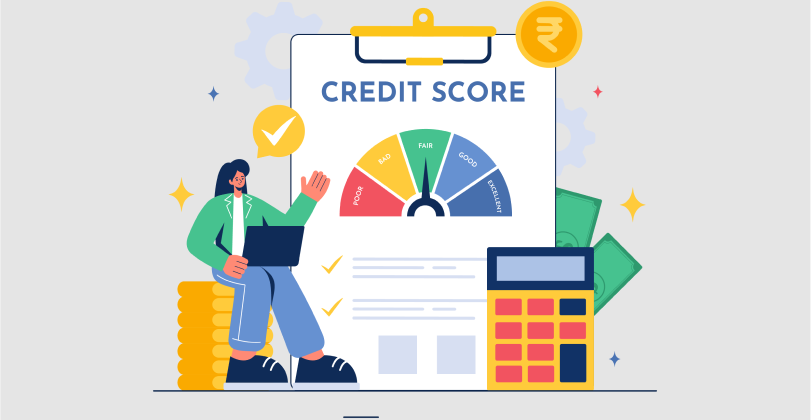Curious about your creditworthiness? Your CIBIL Score, a three-digit number, is the key. It's a reflection of your financial health and plays a pivotal role
Your CIBIL score plays a pivotal role in your ability to secure a business loan. Whether you have a low CIBIL score or are exploring business loans without CIBIL checks, understanding the requirements and improving your creditworthiness is key to unlocking higher funding for your business.
With KreditBee, learn about the minimum CIBIL score for a business loan. Also, find alternative lending options for those with bad credit and actionable tips to boost your score and fuel your entrepreneurial ambitions.
Understanding CIBIL Scores: Your Business's Financial Health Checkup
Your CIBIL score is a three-digit numeric representation of your business's creditworthiness derived from your credit history and financial behaviour. It ranges from 300 to 900, with higher scores indicating better credit health. Lenders use this score to assess your business's ability to repay a loan.
A good CIBIL score opens doors to better loan terms, including lower interest rates and higher loan amounts. Even with a low CIBIL score, there are still options available, such as business loans for low CIBIL scores or bad credit business loans. Understanding your CIBIL score is the first step towards securing the funding you need to fuel your business growth.
Why Your CIBIL Score Matters for Business Loans
Your CIBIL score isn't just a number; it's a key factor in your business's financial success. Here's why it matters:
-
Creditworthiness Assessment
Your CIBIL score is a direct reflection of your creditworthiness. A higher score signals to lenders that you're a responsible borrower, increasing your chances of loan approval. -
Interest Rates
Lenders often offer lower interest rates to businesses with good CIBIL scores. This can result in significant savings over the loan term. -
Faster Loan Approval
A high CIBIL score can expedite the loan approval process, as lenders see you as a lower-risk borrower. -
Loan Limits
Businesses with excellent CIBIL scores may qualify for higher loan amounts, allowing them to access the funds they need for growth and expansion. -
Negotiating Power
A strong CIBIL score can give you leverage to negotiate better loan terms with lenders.
Minimum CIBIL Score Required for a Business Loan
While the minimum CIBIL score for a business loan varies across lenders and loan products, a score of 750 or above is generally considered ideal. This demonstrates a good credit history and responsible financial behaviour, making you a less risky borrower.
However, don't be discouraged if your score is below 750, as KreditBee offers business loans for low CIBIL scores.
Several factors influence the minimum CIBIL score requirement:
- Lender's Risk Appetite: Some lenders are more risk-averse than others and may have stricter requirements.
- Loan Type and Amount: Larger loan amounts or unsecured loans might require higher CIBIL scores.
- Business Vintage and Financials: Established businesses with strong financials might qualify for loans even with lower CIBIL scores.
Company Credit Report (CCR): A Deeper Look into Your Business's Credit Health
A Company Credit Report (CCR) provides a comprehensive overview of your business's credit history, going beyond just the CIBIL score. It offers a detailed picture of your company's financial responsibility.
Here's what a CCR typically includes:
- Identification Information: Basic details about your company, such as name, address, and legal structure.
- Credit History: A summary of your company's past credit accounts, including loans, credit cards, and trade credit.
- Repayment Track Record: Details about your company's repayment behaviour, including on-time payments, late payments, and defaults.
- Outstanding Debt: The total amount of debt your company currently owes to lenders and creditors.
- Credit Utilisation: The percentage of available credit your company is currently using.
- Public Records: Any legal actions or bankruptcies associated with your company.
Reviewing your company's CCR regularly can help you identify areas for improvement and proactively manage your business's credit health.
How to Check Your CIBIL Score for a Business Loan
Checking your CIBIL score is simple and can be done through various online platforms. Here's a quick guide:
- Choose a Credit Bureau: In India, several credit bureaus provide CIBIL scores. Popular options include CIBIL (TransUnion), Experian, Equifax, and CRIF High Mark.
- Visit the Website or App: Go to the chosen credit bureau's website or download their mobile app.
- Fill in the Required Details: You'll need to provide basic information such as your name, date of birth, PAN card details, and contact information.
- Authenticate Your Identity: You might be asked to verify your identity through OTP verification or other methods.
- View Your CIBIL Score and Report: Once authenticated, you can view your CIBIL score and get a detailed credit report that provides insights into your credit history.
How to Improve Your CIBIL Score for a Business Loan
Improving your CIBIL score is an investment in your business's financial future. Here are some actionable steps you can take:
-
Timely Payments
Ensure all your loan EMIs, credit card bills, and utility payments are made on or before the due date. This demonstrates financial responsibility and builds a positive credit history. -
Credit Utilisation
Keep your credit utilisation ratio (the amount of credit you use compared to your total available credit) low. Aim for utilising no more than 30% of your available credit. -
Debt Management
Focus on reducing your existing debts. Paying off high-interest debt first can be a good strategy. -
Credit Mix
Maintain a healthy mix of secured and unsecured credit. This shows lenders that you can manage different types of credit responsibly. -
Limit New Credit Applications
Applying for too many loans or credit cards in a short span can negatively impact your score. Only apply when necessary. -
Regularly Check Your Credit Report
Monitor your credit report for any errors or discrepancies. Report any inaccuracies to the credit bureau immediately for rectification.
By consistently following these tips, you can gradually improve your CIBIL score and enhance your chances of getting approved for a business loan with favourable terms.
Frequently Asked Questions
Yes, it's possible to get a business loan even with a low CIBIL score. Some lenders specialise in loans for borrowers with less-than-perfect credit. However, the loan terms might not be as favourable as those offered to borrowers with higher scores.
The minimum CIBIL score for a business loan varies among lenders. While some lenders prefer a score of 750 or above, others may consider applicants with scores as low as 600-650.
You can improve your CIBIL score by making timely payments, reducing your debt, and avoiding multiple credit applications. Regularly monitoring your credit report and disputing any errors can also help.
Lenders also consider factors like business vintage, annual revenue, profitability, existing debts, and collateral when assessing your business loan application.
You can check your business's CIBIL score through various online platforms offered by credit bureaus like CIBIL (TransUnion), Experian, Equifax, and CRIF High Mark. You'll need to provide your company's details and PAN card information to access your report.
While most lenders require a CIBIL score for a business loan, some alternative lenders might offer business loans without CIBIL checks. These loans typically rely on other factors, such as your business's financial performance, cash flow, and collateral, to assess your creditworthiness.
Yes, you can still get a business loan even with a low credit score. KreditBee specialises in low-credit business loans, offering financing options to businesses that might not qualify for traditional bank loans.
AUTHOR
KreditBee As a market leader in the Fintech industry, we strive to bring you the best information to help you manage finances better. These blogs aim to make complicated monetary matters a whole lot simpler.







